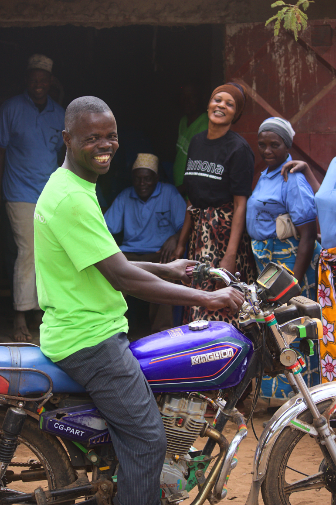Success Story
Stories from Tanzania COVID-19 Response: Group solidarity brings immense business success – The story of Juhudi Group
September 22, 2022
In response to the COVID-19 pandemic in Tanzania, NPI EXPAND implemented a grants program that supported three new and underutilized local partner NGOs for about 6-8 months from July 2020-April 2021. The three NGOs supported 25 WORTH Yetu community groups to add to their income generating activities by producing, promoting, and selling non-medical masks and sanitation products (liquid soap, hand sanitizer). The following story comes from one of these groups. You can read more about the COVID-19 program and lessons learned on our website here.
A group of 28 men and women known as the Juhudi Group manage one of Tanzania’s most distinctive savings and lending organizations in Kahi village, a peri-urban section of Moshi District, Kilimanjaro. The group includes 10 men who are actively participating in group activities in a space that is traditionally dominated by women.
Hemedi Abdulahi, the group’s chairman, discusses how they attracted a large number of males. He says, “Women founded this group. They came up with the idea, and because we have cultivated a culture of good neighborliness here, they assumed that males would be open to it as well, so they invited us. We are fully aware of the abilities that we offer to the group, as well as the numerous essential strengths that women bring. For example, we only have women manage our business accounts since we know they are better financial stewards. This has helped us to run successfully from the beginning.”
This group has a high level of solidarity, some of which can be attributed to a strong constitution that mandates financial and social discipline. For example, the organization imposes a TZS 2,000 penalty for being late to group meetings and a TZS 5,000 no-show fee for group events. Such discipline helped the group succeed in the NPI EXPAND project.
The Juhudi Group is also unique in that it has vast past business experience. The majority of the group’s investments were in farming operations, such as cultivating paddy and beans. Members cited variable weather as their biggest obstacle, resulting in inconsistent outcomes in their farming efforts year after year.
When Juhudi Group was chosen for the project due to their outstanding business and social work performance throughout the years, the members were united in their determination to succeed. Despite being positioned far from the main road and major commercial centers, the group’s unity enabled members to organize themselves to create and sell large quantities of soap, resulting in an initial profit of up to TZS 1.9 million. A portion of this profit was spent on paddy cultivation, which proved profitable, allowing the group to acquire maize milling equipment as well as a motorcycle to carry their products to market. The two investments are projected to provide considerable income and cost savings in the long run. The group’s formal and informal norms have enhanced members’ solidarity.
The group has also used the sewing machines to open a tailoring shop, which is currently run by an experienced tailor. Members are now able to scale up their support for OVC and boost their loan threshold as group savings increase. Omari Athumani, a group member, had saved TZS 500,000 and was granted a loan of TZS 1,500,000 to fund his own paddy plantation. He repaid the debt on time and plans to obtain another loan for TZS 2,500,000.
This group has also been visited by groups that come to Kahi to learn how to establish their own savings and lending communities.

A member of the Juhudi Group on the motorbike purchased from soap-making profits